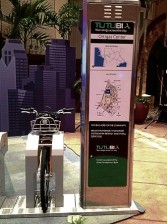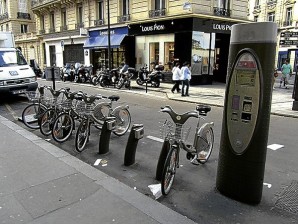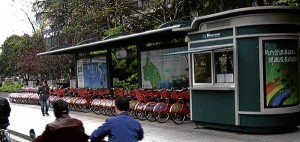Bike sharing initiative in PH
What was once a niche form of transport that was seen only in liberal communities and on college campuses is rapidly becoming a mainstream addition to public transport in many countries.
 Paris offered the tipping point in creating public bicycle-sharing systems that could be implemented in large cities. Its system, called “Velib,” started operating in 2005.
Paris offered the tipping point in creating public bicycle-sharing systems that could be implemented in large cities. Its system, called “Velib,” started operating in 2005.
Currently, there are over 500 public bicycle-sharing systems globally with the largest being here in Asia, in Hangzhou, China. Hangzhou’s bicycle-sharing system has more than 50,000 bicycles.
Public bicycle-sharing systems provide people with bicycles through a network of fully automated stations. A user can pick up a bicycle from one station and return it to any station in the network.
Subscription, smart card
Typically, a user pays an annual subscription fee and accesses the bicycle with a smart card. They are allowed a free period of 30 minutes to one hour after which there is an increasing charge—the goal of charging is to encourage people to return the bicycle for others to use.

MARIKINA’S bikeway network is the most extensive in Metro Manila. A BIKER pedals on the bike lane of the Academic Oval of the UP campus in Diliman, Quezon City.
In systems around the world, most trips are within the free period and people usually do not end up paying more than the annual subscription fee.
Sustainable transport
The Asian Development Bank (ADB) recognizes the benefit that bicycle sharing can play in a community. Through its Sustainable Transport Initiative, ADB is actively promoting bicycle sharing in many cities throughout the Asia Pacific.
It also realizes that there is no better place to start than at home.
Dragonfly
“Tutubi,” Filipino for dragonfly, is a bicycle demonstration project of ADB. Tutubi’s goal is to show the benefits of bicycle sharing to citizens, civic society, government officials and land developers in the Philippines.
Once you see and experience Tutubi, you realize that this is very different from the bicycle you rode as a child or the bicycle you may use for recreation on weekends.
The Tutubi demonstration project currently consists of two stations, each with 10 bicycles. Each bicycle is locked to a dock and each station has a terminal, which looks and works like an ATM (without the money).
Securely locked
Tutubi is fully automated which means that there is no attendant required to man or guard the station. The bicycles are securely locked to the docks and can be accessed only by a smart card. With that smart card you can take and use a Tutubi bicycle anywhere, anytime. When you’re finished you return the bicycle to the automatically locking dock and swipe your card.
Tutubi will say “thank you” and record that you have returned the bicycle. Tutubi was showcased for the first time at the ADB Transport Forum on Nov. 6-8, where it received a warm, yet curious welcome from participants.
Fun
Most of those at the forum had never seen or touched a fully automated bicycle-sharing system before. They didn’t realize how easy, safe and fun it was to borrow a bike. Tutubi will stay at ADB for a month or so, further allowing the bank’s staff to learn how the system works and know the benefits it provides.
The bicycles will be located within ADB’s facility and allow certain employees to take them home in the evening and to run errands around the bank during the day.
Tutubi will soon hit the road, traveling to different locations around Manila and other parts of the Philippines to demonstrate the benefits of a bicycle-sharing system.
Makati, Pasig, Ateneo
Some of the targeted areas are dense city centers and universities. The schedule of demonstration projects is open to areas where government or developers see the benefit of such a system and want to try it out.
Requests have been received by areas such as Makati, Pasig and Ateneo de Manila University in Metro Manila as well as Davao City.
Since Tutubi is only two stations at this point, the exercise is not a fully functional network, as would be implemented in a community.
A complete system in the Philippines would look like Tutubi, but instead of 20 dragonflies there would be a swarm with a network of stations across a city.
Stations 500 meters apart
The stations are normally located about 500 meters away from each other in a dense urban environment. So, whenever or wherever you are, there is a Tutubi station nearby.
The system would be open to the public, allowing people to register for an annual pass online or at special customer service centers. The registration process would record your details to make sure you don’t pedal away for good with your Tutubi.
Last kilometer problem
Citizens would typically use Tutubi for trips that are just too long to walk or too short to drive or take public transport. One of the greatest benefits of a public bicycle-sharing system is its ability to solve the “last kilometer” problem. That is the kilometer that takes you to or from the metro, bus or jeepney station.
Tutubi is quick. You just walk up to any station, swipe your card and a bicycle is unlocked for you. When you arrive at your destination, you find the closest station, insert your bicycle into the dock, swipe your card again and it locks automatically.
Lanes
Public bicycle-sharing systems operate best in dense communities where traffic speeds are lower. Many people ask why install Tutubi in a community without bicycle lanes first? The simple answer is what comes first, the chicken or the egg?
Governments will build bicycle lanes only if people cycle and people will cycle only if there are bicycles available for them. Public bicycle-sharing systems usually go hand-in-hand with safety awareness campaigns and investment in bicycle lanes and infrastructure.
Cost
The cost of a public bicycle-sharing system can be best described as the cost of a Tutubi compared with a private jet. Building an MRT system costs over $50 million per kilometer. A public bicycle-sharing system would cost a tenth of that.
To cover a few square kilometers, $470,000 would be more than enough for the system and the accompanying safety campaign. A public bicycle-sharing system would be run by an operator who would cover the costs through the annual membership fees and by advertising on the bicycles and stations.
Green
Since bicycle-sharing systems are a green form of transport, many private companies are willing to invest in the systems to have their name attached to the bicycles. Barclays Cycle Hire in London is a good example of this.
The experience from other countries shows that the majority of people who use a bicycle-sharing system use it for short trips, around half an hour. The overwhelming majority of users surveyed say that it is more efficient than their previous modes of transport.
Convenient, obesity
In many Asian cities, Manila included, buses are often overcrowded and sometimes people need to go to only one or two stops. Tutubi would be a more convenient solution than waiting in long lines to get on a crowded bus or MRT.
Obesity is also a rising problem in many Asian societies. As income levels rise, so does the move toward more sedentary lifestyles. Obesity leads to health problems like diabetes, which is also on the rise in Asian countries.
Tutubi offers a healthy option for active transport. It further offers the user a low carbon option for transport and provides each of us the opportunity to contribute to a better planet through choosing to reduce our greenhouse gas emissions.
(Bradley Schroeder is a sustainable transport consultant at the Regional and Sustainable Development Department of the Asian Development Bank.)























